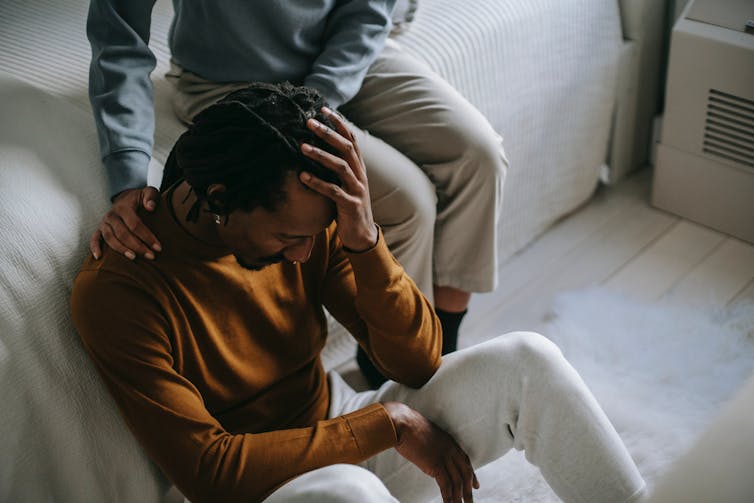
Mental health and suicide prevention have become critical topics of public discussion in the last few decades. Awareness of mental illness has been advanced by public campaigns and personal stories.
There has been tireless advocacy from consumer and carer organisations and mental health institutes. Health care workers, teachers and community members have increased their capacity and expertise in mental health work.
Despite this, mental illness rates continue to rise. Suicide has increased over the last decade, particularly in adolescents and even in children.
So on another RUOK Day, it is understandable we feel unsure a simple question can make a difference. What good is simply asking a family member, friend, or colleague if they are OK? Are we just performing empathy without purpose, making a token query that is ultimately futile? And what do we do if they say “no”?
Poor mental health and mental illness are not the same thing. Just like physical wellbeing, we can be unhealthy without being sick. So how can we best offer support to people who need help across a range of mental health needs?
Recognising stress
Sometimes, people are mentally unwell because of situational stress. Grief, relationship breakdown, job stress, natural disasters and other difficult life circumstances can affect our health, and mean we need additional support.
For other people, stress is long term and severe. People who live with poverty, violence, carer stress, discrimination and loneliness often experience a life of poor health.
People with chronic severe stress often develop physical and mental illnesses, and need additional support.
Increasingly, we are also seeing people struggling with deeper existential issues, particularly in adolescence. Issues like climate change can be so overwhelming young people can feel life has no purpose or meaning.

Read more: 'Brain fingerprinting' of adolescents might be able to predict mental health problems down the line
Knowing how to help
When people disclose the pain of grief, the feeling of overwhelm, or the hopelessness of poverty, it can be difficult to know how to help. Practical strategies like dropping off a meal, or offering to pick up the children from school can be enormously helpful. But so can listening without judgement or offering remedies. A person living with a difficult situation has likely already done their best to solve problems. They may need support more than solutions.
We can help on an individual level, but we can also contribute as a community to local initiatives like food banks, visiting services for the elderly, youth health initiatives.
We can also advocate for fairer and more equitable policies at a state and federal level. No mental health initiative will protect vulnerable Australians if they don’t have a roof over their head, food on the table and safe refuge from violence.
Understanding trauma
People who live with the legacy of trauma can have memories, experiences and emotions that affect them daily, often without warning. Survivors of trauma often have poor physical and mental health. We are only beginning to understand the impact trauma has on the body as well as the mind.
If people disclose trauma, the most important response is to listen. We shouldn’t try to take over managing the situation. People who live with trauma often have little control over their situation, and it is important to support their own decisions and choices.
A simple question like “how can I help?” can allow people to seek support while still maintaining a sense of control.
Treating mental illness
There is a spectrum of mental ill-health, and people who are very unwell may be experiencing mental illness. Mental illnesses can be short term or lifelong, mild to severe, and cover a range of symptoms including distressing thoughts, feelings, physical sensations and behaviours.
People with long term mental illnesses can have periods of stability, and times of crisis, and often need to rely on carers for support.
The diagnosis of a mental illness is often quite difficult, particularly for people who live with other complex needs. Cultural diversity, intellectual disability, physical illness, neurodiversity and other issues can complicate diagnosis. So it’s essential to consult a health professional who is able to make a diagnosis safely.
Although it is tempting to make a diagnosis of depression, anxiety or other mental health conditions using online programs and checklists, mental health symptoms can overlap with a number of physical diseases, including thyroid disease, anaemia and even diabetes or heart disease. For this reason, a physical check-up with a GP can help.
On RUOK Day, checking in with people with a known history of mental illness is important. Although there is often support in the early stages of illness, people with chronic disease of any type often describe feeling lonely and isolated in the longer term.
Living with suffering
We do not have a cure for everything. It is uncomfortable to recognise life is not fair and bad things can and do happen to good people.
It is tempting to offer a raft of potential remedies to avoid having to sit with the profound pain of another human being. It makes us realise we are also vulnerable, and this is uncomfortable.
For this reason, many people with long term suffering often experience loneliness. On RUOK Day, it is worth considering how we as a community can better support the people who need comfort and care all year round.
Read more: There is an urgent need to prevent the lifelong damage caused by adverse childhood experiences
Are we OK?
We may feel comfortable discussing mental health for others but find it difficult to seek mental health support for ourselves.
Self-stigma is real, and prevents us from seeking appropriate care. Guilt and shame can also be symptoms of depression and anxiety.
Perhaps RUOK Day is a good opportunity to book a physical and mental health check-up with your GP.
Finally, we all need to honestly discuss and address the ways we contribute to poor mental health in the community. Workplaces that normalise financial abuse, bullying and harassment cause harm. Domestic violence causes harm. Poverty and discrimination cause harm.
Checking in and connecting with those around us has merit in some circumstances – but we can all reduce mental harm by addressing our own behaviour at an individual, local and national level.
If this article has raised issues for you, or if you’re concerned about someone you know, call Lifeline on 13 11 14.
Louise Stone receives funding from ACT health to research mental health services for young people in the ACT.
This article was originally published on The Conversation. Read the original article.







